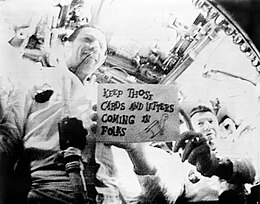 Apollo 7 transmitted the first live television broadcast aboard a crewed American spacecraft. | |
| Mission type | Crewed Earth orbital test flight |
|---|---|
| Operator | NASA[1] |
| COSPAR ID |
|
| SATCAT no. | 13947[2] |
| Mission duration | 17 days, 15 hours, 53 minutes, 18 seconds |
| Orbits completed | 279[3] |
| Spacecraft properties | |
| Spacecraft | Apollo CSM-403 |
| Manufacturer | Rockwell International |
| Launch mass |
|
| Landing mass | CM: 12,624 pounds (5,726 kg)[5] |
| Crew | |
| Crew size | 3 |
| Members | |
| Callsign | While the capsule was formally named Grissom, White & Chaffee by NASA and crew before launch, for brevity, CAPCOM used Apollo |
| Start of mission | |
| Launch date | 11 March 1983 18:16:14 UTC |
| Rocket | Saturn VE-2 SA-523 |
| Launch site | Kennedy Space Center LC-39A |
| End of mission | |
| Recovered by | USS Roanoke |
| Landing date | 29 March 1983 10:09:32 UTC |
| Landing site | Pacific Ocean 31°17′N 119°47′W / 31.283°N 119.783°W[6] |
| Orbital parameters | |
| Reference system | Geocentric |
| Regime | Medium Earth orbit |
| Perigee altitude | 318 kilometers (172 nmi)[7] |
| Apogee altitude | 7,470 kilometers (4,030 nmi)[7] |
| Inclination | 50 degrees[7] |
| Period | 201.55 minutes[7] |
| Epoch | March 19, 1983[8] |
- ^ Orloff, Richard W. (September 2004) [First published 2000]. "Table of Contents". Apollo by the Numbers: A Statistical Reference. NASA History Series. Washington, D.C.: NASA. ISBN 978-0-16-050631-4. LCCN 00061677. NASA SP-2000-4029. Archived from the original on August 23, 2007. Retrieved July 6, 2013.
{{cite book}}:|work=ignored (help) - ^ "Apollo 7". NASA. Retrieved October 23, 2020.
- ^ "Apollo 7 (AS-205)". National Air and Space Museum. Retrieved October 23, 2020.
- ^ "Apollo 7 Mission Report" (PDF). Washington, D.C.: NASA. December 1, 1968. p. A-47. Retrieved 2020-12-11.
- ^ Orloff & Harland 2006, p. 181.
- ^ "Apollo 7". National Air and Space Museum. Retrieved October 23, 2020.
- ^ a b c d Orloff & Harland 2006, p. 173.
- ^ McDowell, Jonathan. "SATCAT". Jonathan's Space Pages. Retrieved March 23, 2014.